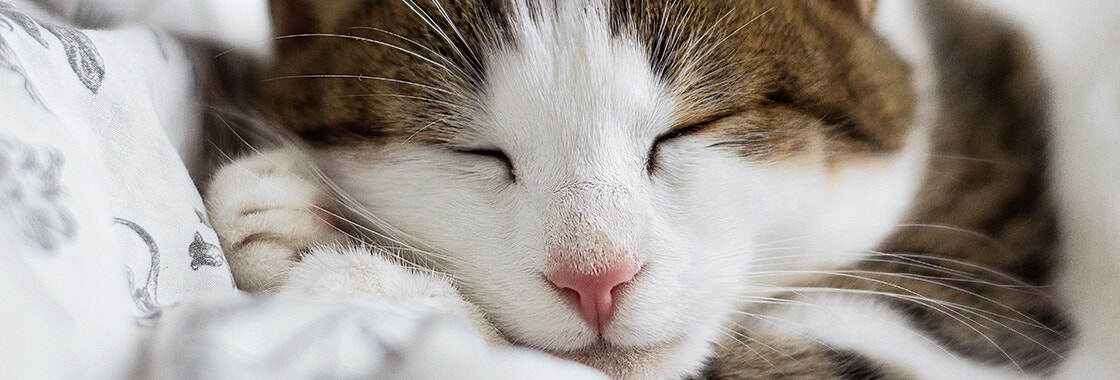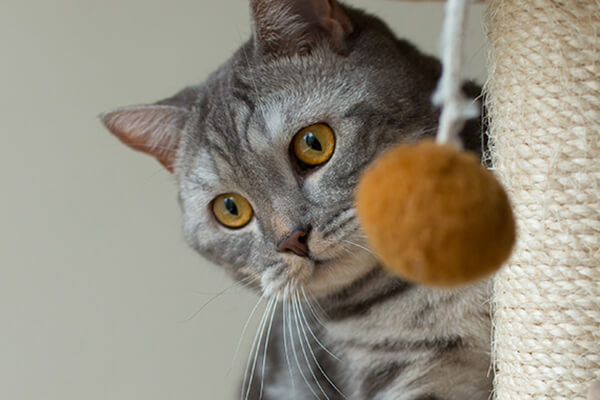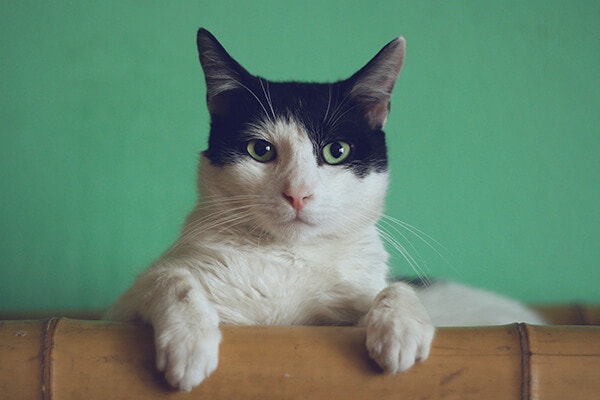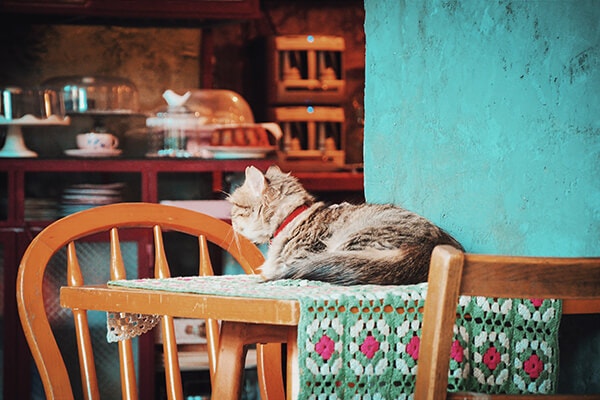Cat snoring: What every pet owner should know


Share
You might’ve thought: ‘cats cannot possibly get any cuter’, and then you hear the sweet sound of a cat snoring! Many cat owners may be unaware that like humans, some cats do snore too. It is normal for cats to snore and usually, there is no cause for concern. However, cats are notorious at hiding illness, which is why it’s important for cat owners to understand why your cat is snoring to ensure there are no underlying health issues.
In this article, we help cat owners understand why cats snore if it’s normal or abnormal, tips to reduce your cat snoring loudly and when you may need to seek veterinary advice. By improving the quality of your cat’s sleep, you can support their health and ensure their bodies are getting enough rest after playing all day.
Why do cats snore while sleeping?
There are various reasons why some cats can snore while sleeping. As a cat owner, you’ll know that cats love their sleep and can naturally sleep between 12-20 hours a day. Since cats sleep so much, it’s unsurprising you may hear cat snores throughout the day. It’s normal for cats to snore loudly when in the deepest stage of their sleep, and they may also twitch and make little noises.
It’s important to first understand what causes the sound of your cat’s snores. Cats have a soft palate in their upper airway - this soft tissue will also relax as your cat relaxes into their slumber. It is the vibration of the soft palate that creates the sound of your cat snoring loudly.
Other reasons your cat is snoring might be due to being overweight, respiratory problems, strange sleeping positions, allergies, infections or inhaling a foreign object. Some cat breeds can snore due to their facial structure. We explore the common reasons why your cat is snoring further below.
Obesity
Overweight cats are becoming increasingly common with 40-50% of the cat population in the UK considered to be overweight or obese. The excess fat usually gathers around a cat’s neck and affects the soft tissue surrounding their upper airway, making breathing more difficult and leading to cats snoring. Besides snoring, there are many other health implications for overweight cats, so managing your cat’s weight is important.
Respiratory Problems
Sometimes cats may suffer from respiratory problems due to a bacterial infection like cat flu, as well as asthma, a fungal infection, or an allergy. These respiratory problems can create a stuffy nose which can cause your cat to snore loudly. If you notice other symptoms including discharge from their eyes or nose, sneezing, coughing or changes in their behaviour or appetite, it’s important to take your cat to the vet for a proper diagnosis and appropriate treatment.
Sleep Positions
Since cats are natural yogis, they are extremely flexible. This means they can get themselves into strange positions when it’s time to sleep. If your cat sleeps with their head tilted, upside down, or pushed up against something, it can temporarily restrict their upper airway which may cause your cat to snore. If your cat is snoring due to their sleeping position, the snoring will usually stop when they move into a different position. In this case, there’s usually nothing to worry about.
Flat-faced Cats
Some cat breeds, such as Persian, Himalayan and Burmese cats, appear to have a flat face - also described as brachycephalic. This is due to the structure of their face consisting of shorter skull bones, with their nasal cavity residing inside their skull. Since flat-faced cats have smaller nostrils, the soft tissue may partially obstruct their upper airway which can cause cat snoring. It may also seem like your cat is snoring while awake due to other breathing problems, such as noisy breathing, breathing through their mouth, or persistent coughing. In this case, you should consult your vet and consider surgery to help your cat breathe more easily.
Foreign Object
If your cat normally doesn’t snore but you’ve noticed the new behaviour, it’s possible they’ve accidentally inhaled a small foreign object, such as a seed, blade of grass or pollen from the garden. If the object is partially blocking your cat’s nasal cavity, it might cause your cat to snore and they may also be agitated. Cat owners should not try to remove the object from their cat’s nose themselves and should instead take them to the vet.
There are other possible reasons why your cat is snoring, including age, inflammation, polyps or growths, which is why it’s essential to take your cat to the vet if the behaviour is new, persistent or accompanied by other symptoms.
The difference between normal and abnormal snoring in cats
It’s important to recognise whether your cat’s snoring is normal or abnormal so you know how best to help them. It may be normal for your cat to snore if they have always done so. This may be due to your cat’s breed, their respiratory rate, or their choice of sleeping position. As long as cat snoring isn’t accompanied by other symptoms and they are getting quality sleep, your cat may just be a natural snorer.
However, it could be abnormal if your cat is snoring loudly if the behaviour starts suddenly, or if it appears as if they’re snoring while awake. If your cat is experiencing other respiratory problems, they may be overweight or have an allergy or infection which is causing them to snore.
It’s important to look out for any of the following symptoms alongside your cat’s snoring:
- Coughing
- Sneezing
- Discharge from eyes or nose
- Changes in behaviour
- Loss of appetite
- Loud snoring
- Choking or gagging sounds
- Noisy breathing
- Breathing through mouth
- Difficulty in breathing
If you notice any of these symptoms, your cat’s snores might not be normal, in which case you should take your cat to the vet. If at any time your cat is struggling to breathe or is wheezing or panting, you should take them to the vet immediately.
In less severe cases, it can also be useful to record your cat snoring to show your vet. This allows them to see your cat’s respiratory patterns whilst snoring to determine the nature and cause of their snores, so they know how to help your cat sleep better.
When should I be concerned about my cat snoring?
You should be concerned about your cat snoring if the behaviour starts suddenly, is louder than usual, or if is accompanied by other symptoms such as distress, wheezing, panting, choking or gagging. If your cat is ever struggling to breathe, you should take them to the vet immediately.
If your cat’s snoring has persisted for a long time and it seems to be affecting their quality of sleep, you should consult a vet to see if it is an anatomical problem that can be resolved with surgery. This may be necessary if your cat is flat-faced, breathes through their mouth, or has an underlying health issue.
Your cat’s snores may be accompanied by other symptoms, such as sneezing, coughing or discharge from their eyes or nose, in which case they may have a respiratory infection or allergy. It’s important to take your cat to the vet for the correct diagnosis and appropriate treatment.
How do I stop my cat from snoring?
You can stop your cat from snoring by resolving the underlying cause. If your overweight cat is snoring, you can support healthy weight loss. If your cat has a respiratory infection causing them to snore, your vet can prescribe treatment, or if their snoring is anatomical, surgery may be necessary.
It’s important to work with an experienced vet to properly care for your cat. If your cat is overweight, your vet can create a plan to help them lose weight safely. As a preventative measure, it’s also important to keep up with your cat’s vaccinations and administer vet-prescribed medication for any bacterial or fungal infections.
If your cat has problems with breathing due to their facial structure, narrow airways or an excess of soft tissue, your vet may suggest surgery to improve their quality of sleep. Your vet can also diagnose any allergies or other respiratory problems.
Cats are stoic animals and are therefore good at hiding their symptoms, we advise you to take your cat to the vet for regular check-ups to help detect any early signs of an underlying health illness. Below is a list of other tips which can help reduce snoring in cats:
- Maintaining a healthy weight
- Ensuring proper nutrition
- Managing stress
- Encouraging exercise
- Keeping sleeping areas clean
- Annual vaccinations
- Regular worming
Whilst cat snoring can be normal, it’s essential that it doesn’t impact your cat’s quality of sleep. By helping your cat to sleep better, you can support their health, improve their energy levels and keep them happy and content. Besides snoring, cats may also engage in other unusual behaviours. If you’re wondering why your cat licks you, we explore this behaviour in our article - including if it's normal and how to stop it - if you don’t like it!



